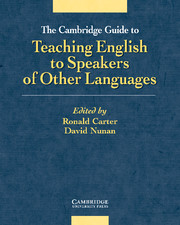Book contents
- Frontmatter
- Contents
- List of figures
- List of abbreviations
- Acknowledgements
- List of contributors
- Introduction
- Chapter 1 Listening
- Chapter 2 Speaking
- Chapter 3 Reading
- Chapter 4 Writing
- Chapter 5 Grammar
- Chapter 6 Vocabulary
- Chapter 7 Discourse
- Chapter 8 Pronunciation
- Chapter 9 Materials development
- Chapter 10 Second language teacher education
- Chapter 11 Psycholinguistics
- Chapter 12 Second language acquisition
- Chapter 13 Bilingualism
- Chapter 14 Sociolinguistics
- Chapter 15 Computer-assisted language learning
- Chapter 16 Observation
- Chapter 17 Classroom interaction
- Chapter 18 English for academic purposes
- Chapter 19 English for specific purposes
- Chapter 20 Assessment
- Chapter 21 Evaluation
- Chapter 22 Syllabus design
- Chapter 23 Language awareness
- Chapter 24 Language learning strategies
- Chapter 25 Task-based language learning
- Chapter 26 Literature in the language classroom
- Chapter 27 Genre
- Chapter 28 Programme management
- Chapter 29 Intercultural communication
- Chapter 30 On-line communication
- Postscript: The ideology of TESOL
- Glossary
- References
- Index
Chapter 3 - Reading
Published online by Cambridge University Press: 07 September 2010
- Frontmatter
- Contents
- List of figures
- List of abbreviations
- Acknowledgements
- List of contributors
- Introduction
- Chapter 1 Listening
- Chapter 2 Speaking
- Chapter 3 Reading
- Chapter 4 Writing
- Chapter 5 Grammar
- Chapter 6 Vocabulary
- Chapter 7 Discourse
- Chapter 8 Pronunciation
- Chapter 9 Materials development
- Chapter 10 Second language teacher education
- Chapter 11 Psycholinguistics
- Chapter 12 Second language acquisition
- Chapter 13 Bilingualism
- Chapter 14 Sociolinguistics
- Chapter 15 Computer-assisted language learning
- Chapter 16 Observation
- Chapter 17 Classroom interaction
- Chapter 18 English for academic purposes
- Chapter 19 English for specific purposes
- Chapter 20 Assessment
- Chapter 21 Evaluation
- Chapter 22 Syllabus design
- Chapter 23 Language awareness
- Chapter 24 Language learning strategies
- Chapter 25 Task-based language learning
- Chapter 26 Literature in the language classroom
- Chapter 27 Genre
- Chapter 28 Programme management
- Chapter 29 Intercultural communication
- Chapter 30 On-line communication
- Postscript: The ideology of TESOL
- Glossary
- References
- Index
Summary
Introduction
Depending on the perspectives of different fields of study, it is possible, broadly speaking, to see reading as practice, product or process. The first has been the interest of anthropologists and social psychologists whose concern is with reading and writing practices as linked to their uses in everyday life, not merely within schooling. The second orientation focuses on the form and meaning of written texts and their constituent parts. The third perspective pays relatively greater attention to the role of the reader in the ongoing processing of written language and the strategies that she or he draws on in constructing meaning from text.
Background
PRACTICE: FOCUS ON THE USES OF READING
A number of scholars have wished to locate discussion of reading within the wider framework of literacy practices, as specific to particular sociocultural environments. This emphasis is of relevance to teachers whose learners come to English language literacy with diverse experience of literacy in a first or other language. Some will be highly literate in a first literacy; others may be acquiring literacy through the medium of English. In either case it is important to see reading and writing as part of language behaviour beyond the learning of specific skills or strategies. Street (1984) introduces a dichotomy between an autonomous model of literacy which sees reading and writing as the learning of skills which are supposedly universally implicated in literacy instruction, and a view of literacy which is called ‘ideological’ and by which reading and writing practices have currency and prestige, not because of any inherent value but because of social and historical factors particular to the cultural setting.
- Type
- Chapter
- Information
- Publisher: Cambridge University PressPrint publication year: 2001
- 6
- Cited by



